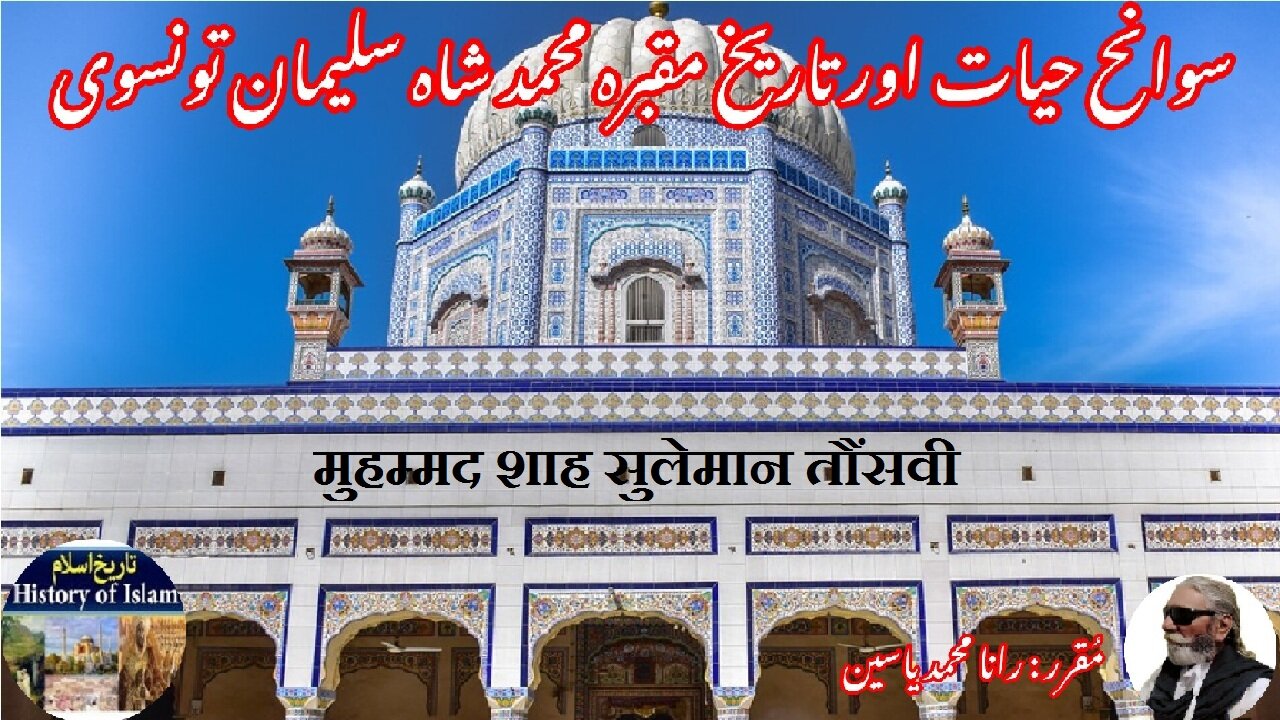Premium Only Content

Muhammad Shah Suleman Taunsvi शाह तौंसवी محمد شاہ سلیمان تونسوی کی سوانح عمری اور مزار کی تاریخ
@islamichistory813 #muhammadshah #suleman #taunsvi #sufisaint #culturalheritage #biography #islamicmysticism #islamicphilosophy #shrine #historicalfigures
Biography of Muhammad Shah Suleman Taunsvi and the history of his shrine
Dekhti Aankhooon aur sountay kaanoon ko Asslamoalaikum, sisters, brothers friends and elders, in informative series videos of Islamic ascolars, sufisaints, cultural heritages, islamic philosophys, islamic mysticisms and historical figures. today we are describing biography of Muhammad Shah Suleman Taunsvi and the history of his shrine.
Muhammad Shah Suleman Taunsvi (1184 A.H / 1770 CE - 1267 A.H / 1850 CE), commonly known as Pir Pathan, was a renowned Sufi saint, scholar, and spiritual leader of the Chishti order. His teachings and influence significantly shaped the spiritual and social landscape of South Asia, particularly in what is now Pakistan. His shrine in Taunsa Sharif remains an important spiritual center, attracting thousands of devotees annually. This essay explores his life, teachings, contributions, and lasting legacy.
Muhammad Shah Suleman was born in 1770 CE (1184 A.H) in what is today known as Taunsa Sharif, located in present-day Pakistan. He was of Pashtun descent, which earned him the title "Pir Pathan." From a young age, he displayed a keen interest in religious studies, spiritual discipline, and Sufi mysticism.
He pursued Islamic education under the guidance of eminent scholars, mastering subjects such as Quranic exegesis (Tafsir), Hadith, Islamic jurisprudence (Fiqh), and Tasawwuf (Sufism). His inclination towards spirituality led him to the Chishti order, which emphasized divine love, self-purification, and service to humanity.
Muhammad Shah Suleman Taunsvi was deeply influenced by the teachings of the Chishti saints, particularly Khwaja Moinuddin Chishti of Ajmer. He became a disciple of a great Sufi master and underwent rigorous spiritual training to attain higher levels of mystical insight.
Through years of meditation, prayer, and self-discipline, he achieved a profound connection with the Divine. His spiritual status attracted many seekers who came to him for guidance and blessings. Over time, he emerged as a prominent Sufi master and established a Khanqah (Sufi lodge) in Taunsa Sharif, which became a center for spiritual enlightenment and social reform.
Muhammad Shah Suleman Taunsvi’s teachings were deeply rooted in the Chishti philosophy, which emphasized love, tolerance, and devotion to God. He advocated for the remembrance of God (Zikr), contemplation, and service to mankind as essential elements of the spiritual path.
Pir Pathan played a vital role in fostering interfaith harmony. He emphasized the importance of unity, compassion, and peaceful coexistence. His message resonated with people from different backgrounds, including Hindus and Sikhs, who visited his shrine for spiritual blessings.
He stressed the importance of humility, honesty, and selflessness in everyday life. According to him, a true Sufi must rise above material desires and dedicate themselves to the service of humanity. He advised his followers to lead a life of righteousness and devotion.
Muhammad Shah Suleman Taunsvi established a system of Langar (free meals) for the needy, ensuring that no one in his vicinity went hungry. His khanqah became a refuge for the poor and destitute.
He emphasized the importance of religious and moral education. His disciples were encouraged to learn and teach Islamic sciences, ensuring that spiritual knowledge was passed on to future generations.
Many people suffering from physical, emotional, and spiritual ailments sought his guidance and were healed through his prayers and spiritual remedies. His deep insight into human nature allowed him to offer counsel that transformed the lives of many.
Muhammad Shah Suleman Taunsvi had numerous disciples who carried forward his teachings. These disciples spread his message far and wide, establishing spiritual centers across the region. His influence continued through generations, making him one of the most revered saints of South Asia.
His Urs (death anniversary) is celebrated annually at his shrine in Taunsa Sharif, drawing thousands of devotees from various parts of Pakistan and beyond. The event serves as a reminder of his teachings and contributions.
Pir Pathan passed away in 1850 CE (1267 A.H), but his spiritual legacy continues to thrive. His shrine remains a significant place of pilgrimage, where devotees seek blessings and spiritual solace.
His contributions to Islamic mysticism, social reform, and interfaith harmony make him an enduring figure in Sufi history. His teachings continue to inspire spiritual seekers, reinforcing the values of love, peace, and selflessness.
Muhammad Shah Suleman Taunsvi was not just a Sufi mystic but a guiding light for countless individuals seeking spiritual and moral guidance. His contributions to Sufism, social welfare, and interfaith harmony cement his legacy as one of the greatest saints of the Chishti order. His teachings remain relevant today, offering a timeless message of love, service, and devotion to God.
With this, we seek your permission until tomorrow, tomorrow we will describe the biography of Mohammad Yousuf Abul Farah Tartusi and the history of his Shrine. Allah Hafiz.
=======================================
-
 5:40
5:40
ISLAMIC HISTORY
18 hours agoScholar Dr. Tahira Qutubuddin doctor taaharah qatb aldin سکالر ڈاکٹر طاہرہ قطب الدین
4 -
 19:54
19:54
GritsGG
15 hours agoMAX SR Win on Warzone! Ranked Tips for Loadout & Landing Spot!
10.4K -
 LIVE
LIVE
Lofi Girl
2 years agoSynthwave Radio 🌌 - beats to chill/game to
331 watching -
 44:41
44:41
Inverted World Live
14 hours agoPolitical Violence in Minnesota w/ AK Kamara
168K18 -
 6:29:40
6:29:40
SpartakusLIVE
14 hours ago#1 Massive MEAT-HEAD can't stop WINNING, can't stop FLEXING
84.7K -
 5:09:25
5:09:25
Drew Hernandez
14 hours agoGIDEON AI THREAT DETECTION SOFTWARE PUSH & NEW EPSTEIN EMAIL LEAK?
55.8K27 -
 2:03:51
2:03:51
TimcastIRL
10 hours agoTrans Minneapolis Shooter BLAMED Massacre On Mom & Gender Transition | Timcast IRL
200K366 -
 47:29
47:29
Man in America
17 hours agoIT DOESN'T ADD UP: The Trans Shooter's Story Is FULL of Holes
67.6K76 -
 3:59:36
3:59:36
StevieTLIVE
10 hours agoFriday Night Warzone HYPE
48.7K1 -
 3:47:10
3:47:10
SynthTrax & DJ Cheezus Livestreams
1 day agoFriday Night Synthwave 80s 90s Electronica and more DJ MIX Livestream Michael Jackson / AI Art Compilation Edition
56K2